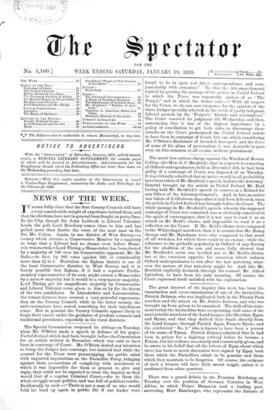The Special Commission reopened its sittings on Tuesday, when Mr.
O'Brien made a speech in defence of his paper, United Ireland, which had been brought before the Commission for an article written in December, which was said to have been in contempt of Court. Mr. O'Brien denied any intention to bring the Judges into contempt, but insisted that while the counsel for the Times were preoccupying the public mind with unproved imputations on the Parnellite Party, bringing against them accusations of complicity with murderers to which it was impossible for them at present to give any reply, they could not be expected to treat the inquiry as they would that of a regular Criminal Court ;—for to them the whole struggle meant politics, and was full of political results. Incidentally he said :—" There is not a man of us who would hold his head up again in public life if our leader were found to be in open aad direct correspondence and com- panionship with assassins." To this the Attorney-General replied by quoting the passage of the article in United Ireland in which the Times was repeatedly spoken of as "The Forger," and in which the writer said :—" With all respect for the Court, we do not care twopence for the opinion of the three Judges specially selected, in the teeth of justly indignant Liberal protest, by the 'Forger's' friends and accomplices." The Court reserved its judgment till Wednesday, and then, announcing that it was of the highest importance by a policy of conciliation to get both sides to discourage these attacks on the Court, pronounced the United Ireland article to have been in contempt of Court, but one which, considering Mr. O'Brien's disclaimer of intended disrespect, and the force of some of his pleas of provocation, it was desirable to pass over, on this occasion at all events, without punishment.


































